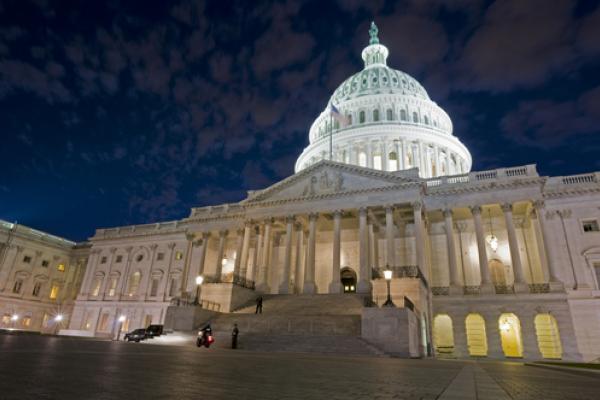What I have heard after visiting 18 cities in six weeks is that people around the country believe that nothing can happen in Washington, D.C. They are basically right. So I am very grateful today to report the one exception.
On Tuesday, the Senate Judiciary Committee approved a new comprehensive immigration reform bill with a bipartisan vote. Did you hear that: “bipartisan.” Amid heartbreaking news of the destruction, grief, and heroism we have seen in Moore, Okla., from one of the worst tornados in American history, millions of Americans found a reason to be hopeful.
This historic immigration bill now goes to the full Senate, where it has a real chance of passing and changing the lives of 11 million aspiring Americans. These are the “strangers” talked about throughout the Bible, and about whom Jesus said, in Matthew 25: how we treat them is how we treat him. That realization has caused a literal biblical conversion in the evangelical Christian community, which with the help of law enforcement officials and business leaders has done the impossible — changed Washington, D.C.
Self-interests, special interests, and even conflicting principles all put this life-changing proposal in grave danger. But in a town defined by gridlock, a group of eight senators crafted a bipartisan proposal that passed with only minor change. The bill reflects agreements reached by the AFL-CIO and Chamber of Commerce; imagine that. It isn’t perfect and no single legislator got everything she or he wanted, but the key elements that many of us have been fighting for are intact. That really is a triumph of the common good.
Now, I am asking you to write your senators and ask them to support this bill on the Senate floor.
“An obstetric fistula,” I said, standing in the pulpit of my 200-year old church, “is a hole between a woman’s vagina and her bowel, or between her vagina and her bladder.”
The congregation’s discomfort was palpable. Later someone told me that they couldn’t believe that I’d had the nerve to say the “v-word” twice! It wasn’t exactly the effect I’d hoped to have, but it wasn’t entirely surprising.
Fistula is a childbirth injury that’s unknown today in the developed West, though before the advent of modern maternity care, it affected women — especially poor women — in America as well as Europe. It was likely the reason, at least in some cases, for a woman being euphemistically spoken or written of as an ‘invalid,’ or as having been ‘invalided’ by the birth of a child. Fistula’s story has always been one of (usually secret) suffering; even the surgery to repair the injury, developed by American gynecologist J. Marion Sims in 1840s Alabama, was performed experimentally upon slaves that Sims purchased for the express purpose of perfecting his technique before turning to white patients.
It’s women of color who still all but exclusively suffer fistula’s life-destroying effects.
Fistula happens when a baby gets stuck while being born, often because a girl is either underage, has a pelvic deformity, or has had her genitals deformed by female genital cutting — and there’s no trained person to help. She’ll labor for days without success. Only after the baby is dead and partially softened does it slip out from the exhausted mother, whose suffering has only begun. Days of pressure from the baby’s head have killed blood vessels in her vaginal tissues, which now decay, leaving a hole — or holes — from which urine and feces leak. She has become incontinent. Her husband divorces her. Her family makes her leave the house because of her stench. She can’t even keep herself clean enough, because the water she walks some distance to collect each day is just enough for basic use. The village children mock her for her stench; her neighbors ignore her.
Her story is multiplied between 50,000 to 100,000 times each year.
The Obama administration formally acknowledged this afternoon that four American citizens have been killed by drone strikes, one intentionally and three who were not targeted. The New York Times reports:
In a letter to Congressional leaders obtained by The New York Times, Attorney General Eric H. Holder Jr. disclosed that the administration had deliberately killed Anwar al-Awlaki, a radical Muslim cleric who was killed in a drone strike in September 2011 in Yemen.
The American responsibility for Mr. Awlaki’s death has been widely reported, but the administration had until now refused to confirm or deny it.
The letter also said that the United States had killed three other Americans: Samir Khan, who was killed in the same strike; Mr. Awlaki’s son Abdulrahman al-Awlaki, who was also killed in Yemen; and Jude Mohammed, who was killed in a strike in Pakistan.
“These individuals were not specifically targeted by the United States,” Mr. Holder wrote.
Read more here.
On May 2, the Evangelical Immigration Table launched its 92 day Pray4Reform Challenge. They sent a letter to Congress challenging decision makers to pass compassionate and fair immigration reform within 92 days. Throughout the 92 days, evangelical Christians across the country will be showing their support by engaging in thoughtful prayer to support their legislators.
As part of the challenge, the EIT is joining in the #iMarch and will be a part of an hour-long #Pray4Reform Twitter town hall. Evangelical leaders, including Sojourners' Jim Wallis (@JimWallis), will be tweeting and conversing with others in support of immigration reform from 4 p.m. to 5 p.m. eastern time.
Christians countrywide also are being asked to join by signing up to be “prayer partners.” Each week during the challenge, they will receive an email or text with guidance on what prayer the Table is lifting up that week. Prayer partners are also encouraged to join the National Day of Prayer on May 30 by holding a dedicated time of prayer event in their communities.
Pope Francis is warning Catholics not to demonize those who are not members of the church, and he specifically defended atheists, saying that building walls against non-Catholics leads to “killing in the name of God.”
“(T)his ‘closing off’ that imagines that those outside, everyone, cannot do good is a wall that leads to war and also to what some people throughout history have conceived of: killing in the name of God,” Francis said Wednesday in remarks at the informal morning Mass that he celebrates in the chapel at the Vatican guesthouse where he lives.
“And that, simply, is blasphemy. To say that you can kill in the name of God is blasphemy.”
Francis explained that doing good is not a matter of faith: “It is a duty, it is an identity card that our Father has given to all of us, because he has made us in his image and likeness.”
Twenty years ago, a gay Mormon character stepped onstage for the first time. His name was Joe Pitt, and he was in Tony Kushner’s Angels in America, Part One: Millennium Approaches.
Pitt lived in New York with a good reputation and a bad marriage to a woman addicted to Valium. As colleagues dealt with the devastation and uncertainty of AIDS — it was the 1980s — he grappled with openly acknowledging his sexuality. He was Mormon. And gay. And the two didn’t mix.
Before Pitt, there was a gay Mormon character in a novel: Brigham Anderson, in Allan Drury’s Advise and Consent, published in 1959. But words like “gay” and “homosexual” weren’t used; it was all innuendo.
Now, the scene has changed: Gay Mormon characters and themes have a growing role in theater and literature.
“God is doing amazing things!” is the Christian way of saying, “Look, we’re popular.”
The idea that faithfully following God’s will is associated with people attending (or donating to) churches, ministries, and organizations is a fallacy that can be debunked by simply looking around us. Islam is growing, Mormonism is growing, and so is Kim Kardashian’s Twitter following. They could all use the exact same logic: that popularity equals success. If we gauge God’s favor by the numbers of followers we have then Justin Bieber is probably God’s newly anointed prophet.
But Christians are addicted to popularity. Denominations focus on church planting, pastors obsess over attendance, budgets rely on congregational turnout, and we pay special attention to Christian leaders who are famous.
In a Westernized culture captivated by success and money, we often make judgments based on the size of a church — or organization, ministry, and community. But our preconceived opinions are often wrong.






